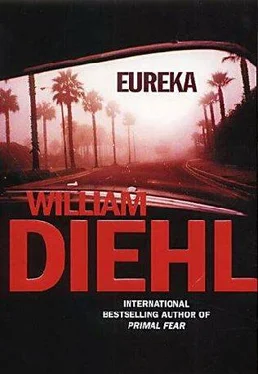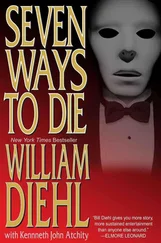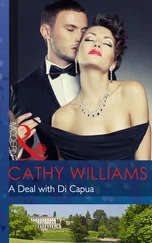William Diehl - Eureka
Здесь есть возможность читать онлайн «William Diehl - Eureka» весь текст электронной книги совершенно бесплатно (целиком полную версию без сокращений). В некоторых случаях можно слушать аудио, скачать через торрент в формате fb2 и присутствует краткое содержание. Жанр: Полицейский детектив, на английском языке. Описание произведения, (предисловие) а так же отзывы посетителей доступны на портале библиотеки ЛибКат.
- Название:Eureka
- Автор:
- Жанр:
- Год:неизвестен
- ISBN:нет данных
- Рейтинг книги:5 / 5. Голосов: 1
-
Избранное:Добавить в избранное
- Отзывы:
-
Ваша оценка:
- 100
- 1
- 2
- 3
- 4
- 5
Eureka: краткое содержание, описание и аннотация
Предлагаем к чтению аннотацию, описание, краткое содержание или предисловие (зависит от того, что написал сам автор книги «Eureka»). Если вы не нашли необходимую информацию о книге — напишите в комментариях, мы постараемся отыскать её.
Eureka — читать онлайн бесплатно полную книгу (весь текст) целиком
Ниже представлен текст книги, разбитый по страницам. Система сохранения места последней прочитанной страницы, позволяет с удобством читать онлайн бесплатно книгу «Eureka», без необходимости каждый раз заново искать на чём Вы остановились. Поставьте закладку, и сможете в любой момент перейти на страницу, на которой закончили чтение.
Интервал:
Закладка:
“I had a vision the first time I saw this valley,” Eli said softly, almost to himself. “And I still see it. I see a pretty village at the bottom of the valley. I see decent homes for workers. I see this valley, the way it is now, lasting forever. A place for good people to live and flourish. I see Ben and Isabel Hoffman marrying, they’ve been sweet on each other since they were children and she’s a nice Jewish girl. I see them raising a family here, surrounded by its beauty. And I see you watching his back, keeping the law. But it won’t happen as long as O’Dell owns half the valley, and Riker and his ilk run Eureka.”
“Buck Tallman keeps the law, sir.”
“Buck is an honorable man, but he’s in his fifties. He tolerates gambling and womanizing and hard drink and brawling. He keeps it controlled, but he was a town-tamer, Thomas. He is from another time. My vision of the valley will never become a reality as long as men like Buck let men like Riker have their way. And my vision won’t happen if O’Dell has his way. He will chop down the trees, turn all of this into power plants and paper mills and shanties for the workers. It will become a slum like Milltown.”
Brodie was uncomfortable talking about the subject. It was not something Eli had ever shared with either of the boys. But his curiosity was rampant.
“Couldn’t you just, uh, buy him out?”
“Been tried, Thomas. This has been going on for two years. O’Dell owns the part of the valley that includes Eureka. He’s a rowdy himself and a spoiler. Our problems could never be worked out. The game was O’Dell’s idea-although I must admit it is the only solution.”
Brodie hesitated for a moment and then said cautiously, “What if it doesn’t turn out the way, uh…”
“It?” When Brodie hesitated again, unsure if he had overstepped his bounds, Eli said, “Ah. You’re referring to the game.”
Brodie nodded. “Everybody knows about it, sir. The whole town’s talking.”
“And what are they saying?”
Brodie turned to Cyclone, held the other half of the apple in the flat of his hand, and the horse took it. “That O’Dell’s a gambler and you ain… aren’t.”
“So they think O’Dell will win?”
“Well, that’s what they’re saying. Riker’s giving five-to-one odds favoring Mr. O’Dell.”
“You familiar with poker?”
“When I lived down there, I used to play a little penny ante with the other kids.”
Eli looked at the youth for a moment, then reached in his pocket, took out some bills, and handed Brodie ten dollars.
“Bet this on me to win. You’ll win fifty dollars after you pay me back the ten.”
Brodie took the bill and stared at it for a moment or two. Ten dollars was a lot of money to Brodie.
“I never knew you to play poker,” he said, folding it carefully and putting it in his pocket.
Eli puffed on his cigar and said, “You know who Andrew Carnegie is?”
“I know he’s real rich.”
“He’s a steel man, Thomas. Made his fortune manufacturing steel. When I was a young man back in Pittsburgh, he took a liking to me and he moved me up in the business. He and some of his rich friends had a poker club. Played once a week. A tough game. Fairly large stakes. One day he invited me to play and I told him I couldn’t afford it.”
Brodie laughed. “What’d he say to that?” he asked.
“He said, ‘You can afford it if you win.’ He sat me down and in one afternoon taught me some of the secrets of poker. Then he gave me two hundred dollars and told me to come to the game that night. I won seven hundred dollars. And became a member of the poker club.”
“What were the secrets?” Brodie asked eagerly.
Eli looked out at the shimmering reflection of the moon on the ocean.
“The most important one,” he answered, “is the art of the bluff.”
Brodie watched Eli walk back to the house, saw the back door open and close. He leaned on the paddock fence for a long time, thinking about everything Eli had said.
Now, suddenly, he had to make some hard decisions.
And then there was the other problem.
He went in the barn and came back with another apple. He broke it in half, gave one to the horse and took a bite out of the other one to chase the dryness from his mouth. He got a bridle and a blanket, slid the blanket over Cyclone’s back, and put the bit in the horse’s mouth. Slinging the reins over the horse’s back, he jumped on and quietly rode out of the paddock and down through the woods to a pathway near the cliff’s edge. Brodie rode south, toward the lights of Eureka. The O’Dell mansion was lit up like a church, its lamps flickering through the trees.
He turned the horse back into the woods and stopped, slid quietly off his back, tethered him to a tree, and gave him the rest of the apple.
“Be quiet, now,” he whispered, then ran his hand down along Cyclone’s mane and slid the blanket off his back before sneaking into the woods. He walked a hundred or so feet to a greenhouse and slipped inside. It was dark. He walked down the aisle of flowers and plants to the rear of the glass shed and stopped, looking back at the big house a hundred yards or so away. A light glowed in the corner room. A signal.
“You’re late,” a soft voice said from the darkness.
It startled him.
“I… we, Mr. Eli and me… we had a talk,” he stammered, and before he could say anything else, she moved quietly from the darkness, gliding to him and putting her arms around his waist.
“I was afraid you weren’t coming,” Isabel Hoffman whispered.
She was so close he could feel her heart beating, a rapid tapping against his chest. He could smell her hair, feel her breath against his throat. In his young life he had never known such longing, never felt a connection with anyone that went so far beyond friendship.
“We have to talk about something,” he said, but she lifted her face to his and kissed him. Her lips were wet and trembling with desire, and he was overwhelmed by her ardor, as he always was and had been for the two months they had been meeting secretly, two or three times a week, in her mother’s greenhouse. It was a tryst that had begun with a note he found in his geography book one morning. It had started innocently enough. They had met at the bakery on the Hill to study for a test. Ben was at his father’s bank, where he worked after school for two hours every day. She had been a little flirtatious at first, then their mutual attraction escalated quickly. She was like a lure, shimmering on the end of a line, and he was hooked.
Now his emotions were in turmoil. He knew how Ben felt about Isabel, but his own longing for her had masked any sense of betrayal.
He was so dizzy with longing he took her in his arms with passionate desperation.
She took the blanket, pungent with the odor of the stallion, spread it on the soft earth in the darkness of the greenhouse, lay down and drew him gently to her, and, in a voice quivering with desire, she said, “I never knew it would be like this, Brodie. I never imagined it would be so wonderful…”
The Social House, as the men on the Hill called it, commanded the northern crest of the valley and had once been a large, sturdy barn and stable, owned by a horse breeder from San Luis Obispo, thirty or so miles away. When the horse breeder died, Eli Gorman bought the property from his estate.
The barn was refinished with teak and mahogany walls, Tiffany windows and lamps, and a slate bar imported from Paris. Fourteen bar chairs lined the bar, and fourteen tables and chairs occupied the sprawling, cathedral-ceilinged main room, each chair with a brass plaque identifying a member, nine of whom lived in sequestered mansions on the Hill. The other five had elaborate cottages and came from Los Angeles or San Francisco on weekends and holidays.
Читать дальшеИнтервал:
Закладка:
Похожие книги на «Eureka»
Представляем Вашему вниманию похожие книги на «Eureka» списком для выбора. Мы отобрали схожую по названию и смыслу литературу в надежде предоставить читателям больше вариантов отыскать новые, интересные, ещё непрочитанные произведения.
Обсуждение, отзывы о книге «Eureka» и просто собственные мнения читателей. Оставьте ваши комментарии, напишите, что Вы думаете о произведении, его смысле или главных героях. Укажите что конкретно понравилось, а что нет, и почему Вы так считаете.












